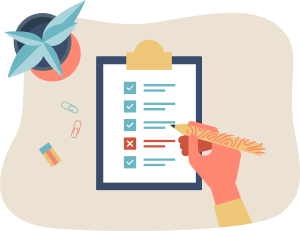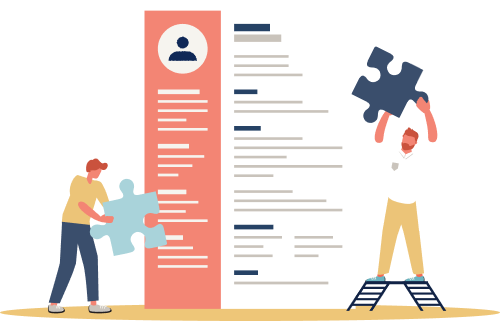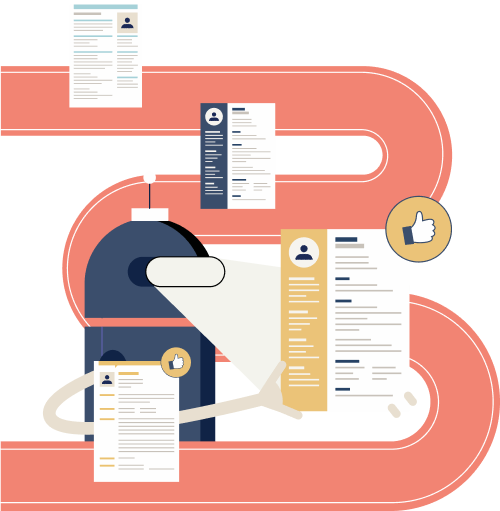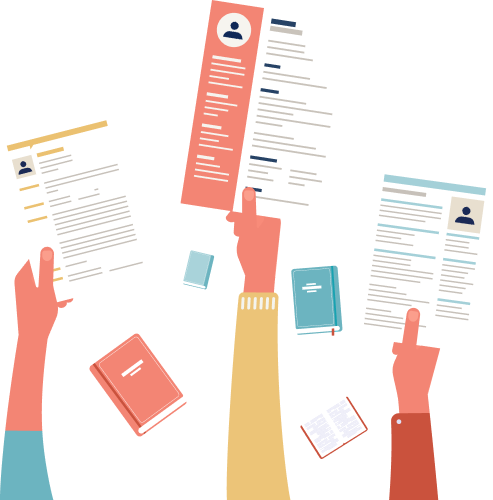50 Questions to Ask in an Interview (and Impress Employers)
Doing an interview can feel nerve-wracking, but it’s not just about answering questions. It’s also about asking the right ones. Thoughtful questions show you’re prepared, genuinely interested, and serious about the job opportunity.
In this guide, we share the best questions to ask in an interview to impress employers, build rapport, and improve your chances of moving to the next stage.


Our customers have been hired by: *Foot Note
Why having questions to ask at an interview matters
You’ve nailed every question so far. You’ve explained your experience, your skills, and why you’re a great fit. Then comes the final part: “Do you have any questions for us?” This isn’t just small talk—it’s a test.
Employers want to see curiosity, preparation, and confidence. If you don’t ask anything, you risk looking unprepared or uninterested. But if you ask the right things, you stand out as a thoughtful candidate who takes the opportunity seriously.
With over 50 examples below, you’ll find the perfect questions to impress employers and leave the interview with confidence.

Questions to ask about the job itself
Asking questions about the position shows that you’re not just looking for any job; you’re ensuring this is the right fit for your goals.
These questions help you understand what the day-to-day responsibilities are, what success means in the role, and where the challenges might be. Employers love hearing them because they show you’re already thinking about how you’ll contribute from day one.
Examples of role-focused questions:
- What does success in this role look like in the first six months?
- What are the biggest challenges someone in this position is likely to face?
- How will my performance be measured and reviewed?
- What would a typical day or week in this role look like?
- What are the primary responsibilities of the position?
- What projects or priorities would I be working on immediately if I were hired?
- Are there opportunities to shape or expand this role over time?
- What can you tell me about the job beyond what was stated in the job description?
- How many people will I be working with?
5 Questions that impress employers
Most candidates ask about duties, salary, or holiday allowances. That’s fine—but if you want to stand out, you need to go deeper. Asking smart, thoughtful questions can turn an interview into a real conversation and leave the interviewer genuinely impressed. These are some of the best interview questions to ask.
Examples of impressive questions:
- What do you personally enjoy most about working here?
- If someone succeeds in this role beyond expectations, what are they doing differently?
- What qualities make employees thrive in this organisation?
- How does the company celebrate wins or achievements?
- What advice would you give to someone starting in this role to succeed quickly?
Good questions to ask about the company
You’ve learned about the role, but what about the bigger picture? An interview isn’t only about whether you can do the job; it’s also about whether the company is a place where you’ll thrive.
When you ask about the company, you show that you’re thinking beyond just the role. Employers see this as a sign you’re interested in their mission, values, and long-term success—not just your pay cheque. It also helps you decide whether the organisation is the right cultural fit for you.
Examples of company-focused questions:
- How would you describe the company culture here?
- What are the company’s main goals for the next year or two?
- How does the organisation support learning and professional development?
- What are the biggest opportunities or challenges the company is currently facing?
- How do different departments work together to achieve company goals?
- How would you describe the management style of this company?
- What do the current employees like most about working here?
Questions to ask about the team and manager
Even the best role can be tough if the team dynamic isn’t right. That’s why it’s smart to ask questions about the people you’ll be working with and the manager who’ll be guiding you. These questions demonstrate that you value collaboration.
Examples of team-focused questions:
- Can you tell me more about the team I’d be working with on a day-to-day basis?
- How would you describe the team management style?
- What qualities do the most successful members of this team have?
- How does the team celebrate successes or handle setbacks?
- What’s the biggest challenge the team is facing right now?
- How do you typically onboard new team members?
- How does this role interact with other departments or teams?
- Are there any team events or activities outside of work?
Questions to ask in a job interview: future prospects
An interview isn’t just about the job in front of you—it’s also about what comes next. Employers want to hire people who are ambitious and see a future with the company. Asking about development shows that you’re thinking long-term and that you want to grow rather than just get by.
Examples of career-focused questions:
- What opportunities for promotion or advancement are available in this role?
- How does the company support professional training or further education?
- Are there mentorship or coaching programmes for employees here?
- Where have people in this position typically moved on to within the company?
- How often do you review career goals and development with employees?
- Would there be opportunities to take on new projects or responsibilities as I progress?
- How do you identify and reward high-performing employees?
- Does the company encourage cross-departmental training or job shadowing?
- Are there international opportunities for employees to grow their careers?
Good questions to ask about benefits and work-life balance
It’s natural to wonder about pay, perks, and balance, but tread carefully. Employers want to know you’re motivated by more than just benefits. Asking one or two thoughtful questions in this area shows you value wellbeing and long-term stability, without making it look like that’s all you care about. These questions are best saved for later in the interview or second-stage discussions.
Examples of benefits and balance questions:
- How does the company support work-life balance for employees?
- Are flexible hours or hybrid working options available for this role?
- Does the organisation offer health or wellness programmes?
- What’s the policy on overtime or weekend work?
- How do managers encourage staff to maintain a healthy balance between work and personal life?
- How does the company approach mental health support in the workplace?
- What employee benefits do staff here value the most?
5 Questions to ask at the end of an interview
The end of an interview is your last chance to leave an impression. Too many candidates say “no, I’m fine” when asked if they have questions. That’s a missed opportunity. A well-chosen final question shows confidence and ensures you walk away with clarity.
Examples of good closing questions:
- What are the next steps in the hiring process?
- Is there anything about my application you’d like me to expand on?
- What would be my top priorities if I were to start in this role?
- When can I expect to hear back regarding the decision?
- How would you describe the ideal candidate for this position?
Asking even one of these questions helps you finish strong and keeps you fresh in the interviewer’s mind.
Questions to avoid asking in an interview

Not every question is a good one. Some can make you look unprepared, too focused on yourself, or even careless. The last thing you want is to undo a strong interview by asking something that raises red flags.
Salary questions too early
Asking “How much does this role pay?” at the first interview makes it seem like money is your only motivation. Save this for later, or phrase it more professionally, such as: “Can you share the salary range for this role?”
Anything you could find online
Don’t ask “What does your company do?” or “Where are your offices located?” These basics can be found on the company’s website. Employers expect you to have done your research.
Negative or critical questions
Avoid things like “Why did the last person quit?” or “Do people usually leave quickly here?” These sound confrontational. Instead, ask something positive, such as, “What makes people enjoy working here?”
Questions about promotions too soon
Asking “When will I be promoted?” before you’ve even started can make you seem impatient. A better approach is to ask, “What career paths have others in this role taken?”
Overly personal questions
Keep it professional. Don’t ask about the interviewer’s age, family, or political views. Stick to role- or company-related questions.
Questions about annual leave or time off too early
Asking “How many holiday days do I get?” right away makes it look like you’re more interested in time off than the job. Save this for later rounds or the offer stage.
Questions that show you haven’t listened
If the interviewer has already explained something, don’t ask about it again. It shows poor attention. Always build your questions from what’s been discussed
Tips for asking questions in an interview

Even with a list of great questions, how you ask them makes all the difference. A few simple strategies can help you come across as confident, curious, and professional:
Prepare in advance
- Write down 5–7 questions before the interview. You won’t need them all, but having them ready stops you from going blank.
Listen carefully
- Build your questions from what the interviewer says. This shows you’re engaged and turns the interview into a conversation.
Don’t wait until the end
- While many candidates save their questions for the final few minutes, it’s even better to ask some throughout the discussion. A good interview should feel like a natural back-and-forth, not a rigid Q&A session.
Prioritise quality over quantity
- You don’t need to ask every question on your list. Three or four well-chosen questions can be more than enough.
Time it right
- Save questions about salary, benefits, or time off for later stages of the hiring process, unless the interviewer brings them up first.
Tailor your questions
- Choose ones that reflect the role and industry you’re applying to. A finance role, for example, might invite questions about performance metrics, while a teaching role might be better suited to questions about class sizes or support resources.
Key takeaways
The questions you ask in an interview are just as important as the answers you give. They show preparation, curiosity, and confidence, while also helping you decide if the role and company are truly right for you.
- Use a mix of categories: questions about the role, the company, the team, career prospects, and a few thoughtful closers.
- Avoid specific questions about pay, perks, or negatives too early in the process.
- Don’t save everything for the end—ask questions naturally throughout the interview so that it feels like a conversation, not an interrogation.
- Asking good questions is only half the battle. You also need strong answers. Check out our guide on common interview questions to make sure you’re fully prepared.

Andrew Smith
Senior Content Writer
Meet Andrew Smith – an accomplished English copywriter with a strong background in SEO optimisation. Passionate about producing engaging content, Andrew has written across various fields, including health and fitness, security, travel, and tourism.
*The names and logos of the companies referred to above are all trademarks of their respective holders. Unless specifically stated otherwise, such references are not intended to imply any affiliation or association with myperfectCV.










